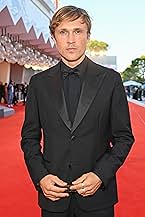IMDb-BEWERTUNG
7,3/10
52.619
IHRE BEWERTUNG
Die Geschichte eines Jungen im turbulenten Neapel der 1980er Jahre. Sorrentinos bisher persönlichster Film ist eine Geschichte über Schicksal und Familie, Sport und Kino, Liebe und Verlust.Die Geschichte eines Jungen im turbulenten Neapel der 1980er Jahre. Sorrentinos bisher persönlichster Film ist eine Geschichte über Schicksal und Familie, Sport und Kino, Liebe und Verlust.Die Geschichte eines Jungen im turbulenten Neapel der 1980er Jahre. Sorrentinos bisher persönlichster Film ist eine Geschichte über Schicksal und Familie, Sport und Kino, Liebe und Verlust.
- Regie
- Drehbuch
- Hauptbesetzung
- Für 1 Oscar nominiert
- 32 Gewinne & 66 Nominierungen insgesamt
Betty Pedrazzi
- Baronessa Focale
- (as Betti Pedrazzi)
Empfohlene Bewertungen
Paolo Sorrentino's autobiographical picture follows the filmmaker's stand-in Fabietto (Filippo Scotti) as an introverted teenager in 80s era Naples. His father Saverio (the great Toni Servillo) and Mother Maria (Teresa Saponangelo; quite engaging) live a comfortable life with their other son Marchino (Marlon Joubert). There is also an extended family of colorful relatives and circle of friends. Fabietto can't help but be mesmerized by his bodacious and extroverted aunt Patrizia (Luisa Ranieri).
Sorrentino has never made a secret about his admiration for Federico Fellini and the first half of the picture is clearly designed with the Maestro's masterpiece AMARCORD in mind. Instead of the rise of Mussolini as a backdrop that ties the vignettes together, here it's the arrival of soccer great Diego Maradona who signs with Napoli and becomes a local legend (the title is in reference to his most famous play). It's when things get more serious in the second half where one sees what inspired Sorrentino to tell such a personal tale. Fabietto is faced with having to truly grow up - and, in a hurry. To decide what his future may be. The anecdotes and episodes continue to be serio-comic and filled with often over the top details. It's very much in the vein of Fellini's early classic, I VITELLONI.
Actor Scotti does very well in trying to channel Sorrentino's alter-ego. He has a natural presence and he does what he can to give the viewer a reason to care about his life. Still, Sorrentino's screenplay never quite unites all of its various threads into a cohesive narrative. We only see snippets of Fabietto's interest in cinema. Not only is Fellini mentioned, but so are other major Directors of Italian cinema such as Franco Zefferelli and Sergio Leone. But, it is local Neapolitan filmmaker Antonio Capuano (played by Ciro Capano) who gives young Fabietto some important but stern advice (Capano became a mentor to Sorrentino). It's a strong sequence, but, far too little and too late in the proceedings to anchor the movie. Just because a film is 'from the heart' doesn't mean it translates well to the screen. One has to invite in the viewer. Here, far too much of it plays like Sorrentino's personal notebook. It's vividly produced with some very fine cinematography by Daria D'Antonio and it has a lively cast, but, it never truly sings. HAND OF GOD gives the viewer some insight into Sorrentino's past, but, it never quite fully connects.
Sorrentino has never made a secret about his admiration for Federico Fellini and the first half of the picture is clearly designed with the Maestro's masterpiece AMARCORD in mind. Instead of the rise of Mussolini as a backdrop that ties the vignettes together, here it's the arrival of soccer great Diego Maradona who signs with Napoli and becomes a local legend (the title is in reference to his most famous play). It's when things get more serious in the second half where one sees what inspired Sorrentino to tell such a personal tale. Fabietto is faced with having to truly grow up - and, in a hurry. To decide what his future may be. The anecdotes and episodes continue to be serio-comic and filled with often over the top details. It's very much in the vein of Fellini's early classic, I VITELLONI.
Actor Scotti does very well in trying to channel Sorrentino's alter-ego. He has a natural presence and he does what he can to give the viewer a reason to care about his life. Still, Sorrentino's screenplay never quite unites all of its various threads into a cohesive narrative. We only see snippets of Fabietto's interest in cinema. Not only is Fellini mentioned, but so are other major Directors of Italian cinema such as Franco Zefferelli and Sergio Leone. But, it is local Neapolitan filmmaker Antonio Capuano (played by Ciro Capano) who gives young Fabietto some important but stern advice (Capano became a mentor to Sorrentino). It's a strong sequence, but, far too little and too late in the proceedings to anchor the movie. Just because a film is 'from the heart' doesn't mean it translates well to the screen. One has to invite in the viewer. Here, far too much of it plays like Sorrentino's personal notebook. It's vividly produced with some very fine cinematography by Daria D'Antonio and it has a lively cast, but, it never truly sings. HAND OF GOD gives the viewer some insight into Sorrentino's past, but, it never quite fully connects.
"Cinema is a distraction, reality is second-rate." Fellini (overheard in in this movie)
As Oscar-winning director Paolo Sorrentino's stand-in, Fabietto (Filippo Scotti), comes of age in The Hand of God, he experiences the vagaries and beauties of Neapolitan life, not the least of which is his growing love of cinema. While half way through he will experience a life-changing tragedy, he will throughout be an observer of Naples with its Fellini-like freaks and gorgeous gulf-coast scenery. In a way, this is Sorrentino's Amarcord.
The Hand of God is a title derived from the description of soccer god, Diego Maradona, and his magical, controversial goal in the 1986 World Cup quarterfinal. It also could refer to the Sistine Chapel's fingers, and many other references that bolster this luminous description of Sorrentino's early life in Naples.
When Fabietto sees his aunt, Patrizia (Luisa Ranieri), naked on occasion, Sorrentino shows the emerging appreciation of sexuality in a young-man's sensibility and the parallel lushness of Italy, whose food is legendary and sensuality eternal. Both his older brother Marchino (Marlon Joubert) and he are transfixed by the eroticism, which undoubtedly creeps into all of Sorrentino's work.
Patrizia fuels the erotic fantasies of Fabietto and his older brother Marchino (Marlon Joubert), an aspiring actor too conventionally handsome to be of interest to the great Fellini.
It's as if Sorrentino is saying that these images helped him form his cinematic persona and lifelong affection for his youth in a culturally-rich country. The appearance of a Neapolitan folklore hero, a child monk in a sumptuous palazzo with a deteriorating chandelier, is just one of the many images Sorrentino uses to emphasize the wealthy culture he grew up in.
In addition to the tragedy, Fabietto is most moved by an encounter at a shoot in the historic Galleria Umberto I with director Antonio Capuano (Ciro Capano), his future mentor, who explains cinema with a hard-nosed philosophy that incorporates individuality as the driving force. Upon giving himself to courage and perseverance, as director Capuano advises, Fabio will be a hope of Italian cinema, incorporating the lyrical jumble of happy images from his tender youth to the contemplative awareness in his growing years.
From the Felliniesque characters of his youth-circus-like fat women, goddess-like nymphs, and bold friends like Armando (Biaggio Manna-a John Belushi type), Fabio will break the bounds of domestic life and teen-age longings to strike out into a cinematic world that promises to be at least a distraction rather than a second-rate experience.
Sorrentino has been touched by the hand of God.
As Oscar-winning director Paolo Sorrentino's stand-in, Fabietto (Filippo Scotti), comes of age in The Hand of God, he experiences the vagaries and beauties of Neapolitan life, not the least of which is his growing love of cinema. While half way through he will experience a life-changing tragedy, he will throughout be an observer of Naples with its Fellini-like freaks and gorgeous gulf-coast scenery. In a way, this is Sorrentino's Amarcord.
The Hand of God is a title derived from the description of soccer god, Diego Maradona, and his magical, controversial goal in the 1986 World Cup quarterfinal. It also could refer to the Sistine Chapel's fingers, and many other references that bolster this luminous description of Sorrentino's early life in Naples.
When Fabietto sees his aunt, Patrizia (Luisa Ranieri), naked on occasion, Sorrentino shows the emerging appreciation of sexuality in a young-man's sensibility and the parallel lushness of Italy, whose food is legendary and sensuality eternal. Both his older brother Marchino (Marlon Joubert) and he are transfixed by the eroticism, which undoubtedly creeps into all of Sorrentino's work.
Patrizia fuels the erotic fantasies of Fabietto and his older brother Marchino (Marlon Joubert), an aspiring actor too conventionally handsome to be of interest to the great Fellini.
It's as if Sorrentino is saying that these images helped him form his cinematic persona and lifelong affection for his youth in a culturally-rich country. The appearance of a Neapolitan folklore hero, a child monk in a sumptuous palazzo with a deteriorating chandelier, is just one of the many images Sorrentino uses to emphasize the wealthy culture he grew up in.
In addition to the tragedy, Fabietto is most moved by an encounter at a shoot in the historic Galleria Umberto I with director Antonio Capuano (Ciro Capano), his future mentor, who explains cinema with a hard-nosed philosophy that incorporates individuality as the driving force. Upon giving himself to courage and perseverance, as director Capuano advises, Fabio will be a hope of Italian cinema, incorporating the lyrical jumble of happy images from his tender youth to the contemplative awareness in his growing years.
From the Felliniesque characters of his youth-circus-like fat women, goddess-like nymphs, and bold friends like Armando (Biaggio Manna-a John Belushi type), Fabio will break the bounds of domestic life and teen-age longings to strike out into a cinematic world that promises to be at least a distraction rather than a second-rate experience.
Sorrentino has been touched by the hand of God.
Although I have only an embryonic understanding of Italian, I felt the rhythm and mood of the scenes allowed me to feel the soul of Naples on a cellular level.
A brilliant piece of filmmaking that totally took my breath away. This feels a lot personal because it is. Sorrentino created this film with an enormous love and you just feel it. His use of camara is outstanding, applying a lot of different techniques to give us some really beautiful shots and scenes, all of them unforgettable.
The first hour is magic. I laughed more than in most comedies I've seen. I was totally in awe with all those fascinating and lively characters. Everything feel so alive, so real. The sense of community is palpable.
The second hour is emotionally brutal. Sorrentino doesn't want to stay for a long time on overdramatic scenes. Just the necessary to tell his story. But he does it through powerful images and with a lot to say.
Even if this film is personal to the director, I believe this will feel familiar to a lot of us and that is the beauty of the cinema: a personal individual story can touch many people. Great homage to Napoli and cinema in a fantastic coming of age film.
The first hour is magic. I laughed more than in most comedies I've seen. I was totally in awe with all those fascinating and lively characters. Everything feel so alive, so real. The sense of community is palpable.
The second hour is emotionally brutal. Sorrentino doesn't want to stay for a long time on overdramatic scenes. Just the necessary to tell his story. But he does it through powerful images and with a lot to say.
Even if this film is personal to the director, I believe this will feel familiar to a lot of us and that is the beauty of the cinema: a personal individual story can touch many people. Great homage to Napoli and cinema in a fantastic coming of age film.
Having seen four of Paolo Sorrentino's movies now, I have finally and regrettably seen enough to admit that I am not a fan of his work. For some reasons, his movies don't engage me enough emotionally to care. Le conseguenze dell'amore (The Consequences of Love) was an interesting look into the life of a man with a dark secret, but I believed that it would have worked better as a character study if the revelation at the end had come earlier in the movie. I liked Youth better, a modest and entertaining contemplation of ageing, even though as a 40-something, it didn't fully move me either.
His celebrated La Grande Bellezza (The Great Beauty) was voted Best Movie of the Year by many, but it left me puzzled, as I saw little more than short vignettes about Roman life without much of an overall encompassing idea, story thread or theme. I watched it again to make sure that I didn't miss anything, but my response was largely the same: lots of eye candy with little nutritional value for the mind. And that is probably no coincidence, because I have the same problems and more with The Hand of God.
I know that Sorrentino's work is quite beloved and that many people probably enjoyed or will enjoy this film as a lovingly disarming portrait of family and tragedy, wrapped around a coming-of-age story. Good for them, because what I unfortunately saw again was a too loosely connected series of scenes that emotion-wise go all over the place, and felt more like numerous short films tacked together than a sincere chronicle. It took me almost half the movie to get a grip on the many family members who Sorrentino loves to present with all their peculiarities, but most of these characters are merely one-dimensional charicatures with a social or physical handicap who don't get the screen time needed to get emotionally invested in them. This would have been okay if this had been a broad comedy or even a crude farce about a dysfunctional family, but I simply didn't find it that funny. Although some scenes elicited a smile, none of them are exactly laugh out loud, and since they didn't really connect or reinforced one another, I saw little progress in the story.
When the big plot development happens in the second half, things started to look more promising for a while. But even here, Sorrentino barely uses the plot elements at his disposal to pull at some heartstrings. Every time something seems ready to be fleshed out, we cut to a completely different scene where we can enjoy the great locations and photography or another weird character, but instead of depth, it adds yet another new shade to a canvas that is already full of a wide variety of colored spots. I failed to see a bigger picture, to my regret.
Sorrentino is clearly more of a moodpainter than a good storyteller, and that is apparently what a lot of viewers love about his movies. I remember the most famous scene from Youth where Michael Caine and Harvey Keitel watch in dumbstruck awe as a beautiful young and naked woman enters their swimming pool, and Hand of God has a similar scene with Aunt Patrizia that elicits a similar mix of sensations, somewhere between awkwardness and lustful ecstasy. So for those who also loved La Grande Bellezza for its colorful mix of emotions and sensations, go and watch it. For the rest, I would recommend the Italian classic Cinema Paradiso, a deeply moving coming of age story that did work for me, or even Disney's Encanto for a truly funny and heartwarming story about dysfunctional families.
His celebrated La Grande Bellezza (The Great Beauty) was voted Best Movie of the Year by many, but it left me puzzled, as I saw little more than short vignettes about Roman life without much of an overall encompassing idea, story thread or theme. I watched it again to make sure that I didn't miss anything, but my response was largely the same: lots of eye candy with little nutritional value for the mind. And that is probably no coincidence, because I have the same problems and more with The Hand of God.
I know that Sorrentino's work is quite beloved and that many people probably enjoyed or will enjoy this film as a lovingly disarming portrait of family and tragedy, wrapped around a coming-of-age story. Good for them, because what I unfortunately saw again was a too loosely connected series of scenes that emotion-wise go all over the place, and felt more like numerous short films tacked together than a sincere chronicle. It took me almost half the movie to get a grip on the many family members who Sorrentino loves to present with all their peculiarities, but most of these characters are merely one-dimensional charicatures with a social or physical handicap who don't get the screen time needed to get emotionally invested in them. This would have been okay if this had been a broad comedy or even a crude farce about a dysfunctional family, but I simply didn't find it that funny. Although some scenes elicited a smile, none of them are exactly laugh out loud, and since they didn't really connect or reinforced one another, I saw little progress in the story.
When the big plot development happens in the second half, things started to look more promising for a while. But even here, Sorrentino barely uses the plot elements at his disposal to pull at some heartstrings. Every time something seems ready to be fleshed out, we cut to a completely different scene where we can enjoy the great locations and photography or another weird character, but instead of depth, it adds yet another new shade to a canvas that is already full of a wide variety of colored spots. I failed to see a bigger picture, to my regret.
Sorrentino is clearly more of a moodpainter than a good storyteller, and that is apparently what a lot of viewers love about his movies. I remember the most famous scene from Youth where Michael Caine and Harvey Keitel watch in dumbstruck awe as a beautiful young and naked woman enters their swimming pool, and Hand of God has a similar scene with Aunt Patrizia that elicits a similar mix of sensations, somewhere between awkwardness and lustful ecstasy. So for those who also loved La Grande Bellezza for its colorful mix of emotions and sensations, go and watch it. For the rest, I would recommend the Italian classic Cinema Paradiso, a deeply moving coming of age story that did work for me, or even Disney's Encanto for a truly funny and heartwarming story about dysfunctional families.
Wusstest du schon
- WissenswertesAccording to Paolo Sorrentino, it was Alfonso Cuarón's Roma (2018), which was based on Cuaron's childhood in Mexico City, that gave Sorrentino permission to commit his own experience to film. For Sorrentino realized that "a personal, private film could tell a universal story."
- Zitate
Antonio Capuano: Remember, those without courage don't sleep with beautiful women.
- SoundtracksNapule è
Written and performed by Pino Daniele
Top-Auswahl
Melde dich zum Bewerten an und greife auf die Watchlist für personalisierte Empfehlungen zu.
- How long is The Hand of God?Powered by Alexa
Details
- Erscheinungsdatum
- Herkunftsländer
- Offizieller Standort
- Sprachen
- Auch bekannt als
- Fue la mano de Dios
- Drehorte
- Produktionsfirmen
- Weitere beteiligte Unternehmen bei IMDbPro anzeigen
Box Office
- Budget
- 13.049.974 € (geschätzt)
- Weltweiter Bruttoertrag
- 167.909 $
- Laufzeit
- 2 Std. 10 Min.(130 min)
- Farbe
- Sound-Mix
- Seitenverhältnis
- 2.39 : 1
Zu dieser Seite beitragen
Bearbeitung vorschlagen oder fehlenden Inhalt hinzufügen






















